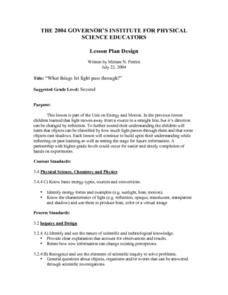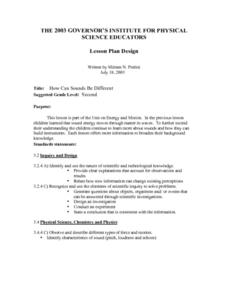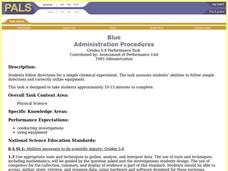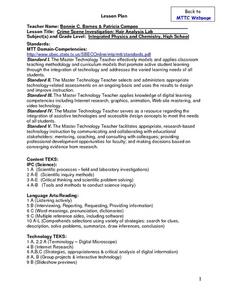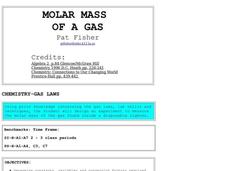Curated OER
How Effective is Perspiration at Cooling?
Students collect data on the cooling of water in two different test tubes, one that is wrapped in wet newspaper and one in dry newspaper. They then relate this cooling effect to the body's perspiration.
Curated OER
Let the Sunshine in
Students collect and analyze data to study wavelengths of visible light. They cover Styrofoam cups with three different colors of sun filtering products and shine a lamp directly on the cups. They determine the most effective filtering...
Curated OER
The Nutritional Content of Food
High schoolers are given three unknown samples and must perform two chemical tests in order to determine if the samples contains protein and/or starch. Students work with corrosive or toxic reagents.
Curated OER
What things let Light Pass Through?
Second graders classify objects according to how well light can pass through them and predict how well objects will transmit light. They experiment with objects to verify predictions while collecting, recording, and interpreting data...
Curated OER
Inertia
Students conduct an experiment to apply Newton's first law of motion. They observe the inertia of an object in regard to its mass. The students record and graph the outcomes of their investigation and present the relationship between...
Curated OER
How Can Sounds Be Different
Second graders explore energy and motion. They investigate how sound energy moves in waves. Students explore how sounds are varied and how the instruments that make those sounds are built. They observe sounds being produced and predict...
Curated OER
Kites: Patang - The Indian Fighter Kite
Students investigate the history of fighter kites and build their own. In this aeronautics lesson, students discover how other countries utilize fighter kites and where they originated. Students create their own fighter kites in class...
Curated OER
Boyle's Law
Students experiment on Boyle's law using balloons and other common materials. In this chemistry instructional activity, students explain the relationship between pressure and volume. They solve problems relating to Boyle's Law.
Curated OER
Blue
Students follow directions for a simple chemical experiment. They use the appropriate tools and techniques to gather, analyze, and interpret data. Students identify a substance that has characteristic properties, such as density, a...
Curated OER
Renewable Energy Plants in Your Gas Tank: From Photosynthesis to Ethanol
Students examine the role photosynthesis plays in plant survival. In this renewable energy lesson students document their observations and analyze and interpret their results.
Curated OER
Secrets from the Sea
Students utilize technology for research. They research the potential causes of the sinking of the Hunley.
Curated OER
Hlf-Ball
Young scholars investigate Newton's Laws of Motion and the Law of Conservation of Energy. They examine how a ball and half-ball behave and relate these laws to what happens to the ball. Students produce a graph of the data collected...
Curated OER
Mapping the Blue Part
Eighth graders determine the location of specific features of the stimulated ocean floor. The features include the continental shelf, continental slope, an ocean trench, and a mid-oceaniz ridge.
Curated OER
Building Materials
Fifth graders are presented with three rocks and a variety of tools and are asked to investigate the properties of the rocks to see which rock is best for building tables and benches for a museum picnic area.
Curated OER
Deliver
Students measure the mass, volume, length and area of various objects. They are assigned a letter. The task is assesses students' abilities to make simple observations and measurements.
Curated OER
Instruments and Measurement
Students circulate through stations to determine the proper instrument to make a certain type of measurement. They must make measurements of mass, volume, length, area, electrical current, temperature and force.
Curated OER
How Do The Colors of Light Mix?
Students investigate the mixing of light. They form a hypotheses to reason why color changes occur and they write conclusions and ask new questions arising from the investigation. Students identify the primary and complementary colors of...
Curated OER
Crime Scene Investigation: Hair Analysis Lab
Students participate in a hair analysis lab. Using a digital microscope, students compare and contrast hair samples. They determine if the hair samples are human or animal. After completing lab results sheets, students share their...
Curated OER
The Survey Says
Young scholars experience the development of statistical data. In groups, they construct a survey questionnaire for a target audience. Students produce the questionnaire, distribute it, collect it, and tabulate the data. Using EXCEL,...
Curated OER
Mass vs. Weight
Students explore physical science by conducting a measurement experiment. In this mass lesson, students identify the differences between mass and weight and define a list of other vocabulary terms. Students utilize electronic scales and...
Curated OER
Clouds
Third graders complete various activities about clouds. They create a cloud in a lab, write a cloud story, make a cloud model and complete a webquest.
Curated OER
Enhancing Uptake of Glucose in Rabbit Muscle Cells
Students observe diffusion of glucose through a cell membrane and research the function of chromium picolinate in glucose uptake into a cell. They conclude and understand the role of insulin and chromium picolinate in the uptake of...
Nazareth College
Create Your Own Tornado
Third graders identify key concepts and definitions about tornados. They work in small groups of three to four to create mini-tornados. After reading Tornado Alert as a class, 3rd graders discuss tornados and fill out a KWL chart.
Curated OER
Molar Mass
Students apply the ideal gas law and Dalton's Law of Partial Pressure to develop an experiment which determine the molar mass of butane from disposable lighters. In small groups, they develop a procedure and have it approved before...





